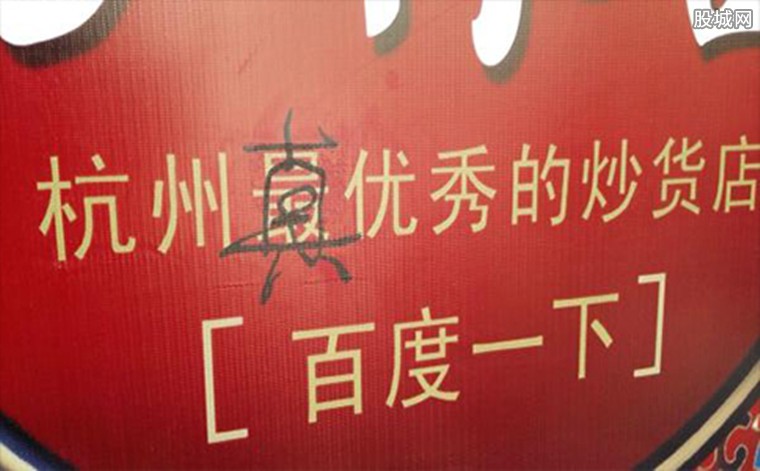The mostest and the bestest
« previous post | next post »
Photograph of a sign in Hangzhou:
The first line of the sign says:
Hángzhōu zuì yōuxiù de chǎohuò diàn 杭州最优秀的炒货店
("Hangzhou's most outstanding shop for roasted seeds and nuts")
The original zuì 最 ("most") on the sign has been written over with the character zhēn 真 ("truly"). The reason for this will be explained below.
The second line of the sign says:
Bǎidù yīxià 百度一下
("check it on Baidu")
This seems to be the slogan of the shop. It is appropriated from the slogan for the search engine called Baidu:
Bǎidù yīxià, nǐ jiù zhīdào 百度一下,你就知道
("If you check it on Baidu, you'll know; use Baidu search, you'll see")
Baidu is China's Google clone. See:
"Soon to be lost in translation" (7/11/10)
As for what prompted the shopowner to write zhēn 真 ("truly") over zuì 最 ("most"), here's a report:
"CHINA TRANSLATED: Mafia, vaccinations, and a most unfair fine"
On March 22, a snack bar in Hangzhou was reportedly fined 200,000 yuan ($30,900) for saying “The Best of Hangzhou,” and “The Best of China,” on its in-shop signboards. The city’s Market Supervision Administration said using the term “most” is a violation of Advertisement Law.
The owner complained that the fine was too heavy for him: “200,000 yuan is what the bar earns in a whole year. I have taken away the terms as required. It is not right to kill my business over just this.” The authorities denied the complaint, claiming that the regulation was issued last September and the owner was responsible for learning about new laws.
Many who read the news expressed sympathy toward the shop owner. One remark said: “I just cannot understand how the government fails to supervise the vaccine market properly while it has time to punish things like this.” Another remark riffed on the Communist Party’s notorious slogan “The sun is the reddest, Chairman Mao is dearest,” saying “I guess the Party should be fined billions of yuan for the most unreal advertisement in history?”
The reference to tainted vaccine is to the major medical mishap that occurred last week. It caused a huge public furor that is described in this article:
"China vaccine scandal: 37 arrested" (BBC, 3/23/16)
[Thanks to Yixue Yang]

Guy said,
March 30, 2016 @ 11:36 pm
I take it that "zuì" exhibits the same polysemy as English "most" that allows uses like "that would be most welcome" to mean "that would be quite welcome" (no implication of comparison)? Or is this more like fluff, which sort of has the "proper" superlative meaning but isn't meant to be taken seriously, like that found in "America's finest [insert product here]"?
John Swindle said,
March 31, 2016 @ 12:43 am
@Guy: More like the second.
AntC said,
March 31, 2016 @ 1:05 am
Thank you Victor.
w.r.t. the vaccine scandal, is the "China office" of the WHO an independent authority? Can Chinese consumers trust it when it downplays the risk of a toxic reaction? I would have thought, just as importantly, that illicit or improperly stored vaccines would not be effective in building systemic resistance. So do all the kids have to get vaccinated again? Does this office not understand 'herd immunity'. I'm hearing quite an angry response in the Chinese community.
Curiosly on the BBC page you link to about the vaccine scandal, there's a marvelous ambiguity in the hed for a different piece:
"Chinese Korean War remains repatriated"
JK said,
April 1, 2016 @ 12:56 pm
As a random observation about Baidu, I noticed that it apparently has no Uyghur search ability.
A search for the name of Shohret Zakir, current Uyghur chairman of Xinjiang, appears to give nonsense replies:
http://www.baidu.com/s?ie=utf-8&f=8&rsv_bp=0&rsv_idx=1&tn=baidu&wd=%D8%B4%DB%86%DA%BE%D8%B1%DB%95%D8%AA%20%D8%B2%D8%A7%D9%83%D9%89%D8%B1&rsv_pq=d088689a0003eed8&rsv_t=77b8Hx3oUH1YHC8zIqkxWLhtD7MlmDj4ITlJUSoriwQtW94nknDDB302BUU&rsv_enter=1&rsv_sug3=2&rsv_n=2&rsv_sug2=0&inputT=629&rsv_sug4=763
Victor Mair said,
April 1, 2016 @ 4:24 pm
Notes from Song Ju:
http://m.sohu.com/n/436313065/
1. 炒货店 means shop for all kinds of roasted seeds and nuts, generally this kind of shop is roasting them in front of guests.
2. 百度一下 mean "check it on Baidu" or telling readers you could find something interesting if you search the above key words in 百度.
Gnoey said,
April 3, 2016 @ 3:24 am
@Guy “最” always carries a superlative meaning ("the most…"); that's why it's often used in ads. "Most" in "That would be most welcome", "He was most happy to see her" etc. wouldn't be expressed by “最”, but rather by adverbs expressing large degree like “很” (hěn), “非常” (fēicháng), etc.
K. Chang said,
April 6, 2016 @ 1:04 am
百度一下 should be rendered as "(Just) Baidu It", much like Americans use Google as a verb "Let me Google that for you…"